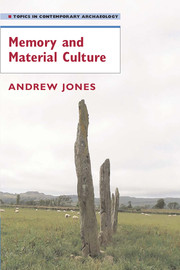Book contents
- Frontmatter
- Contents
- Preface
- 1 Memory and Material Culture?
- 2 From Memory to Commemoration
- 3 People, Time, and Remembrance
- 4 Improvising Culture
- 5 Continuous Houses, Perpetual Places: Commemoration and the Lives of Neolithic Houses
- 6 Culture, Citation, and Categorisation: Regionality in Late Neolithic Britain and Ireland
- 7 Chains of Memory: The Aesthetics of Memory in Bronze Age Britain
- 8 The Art of Memory: Memory, Inscription, and Place
- 9 Tracing the Past: Landscape, Lines, and Places
- 10 Coda
- References
- Index
Preface
Published online by Cambridge University Press: 07 December 2009
- Frontmatter
- Contents
- Preface
- 1 Memory and Material Culture?
- 2 From Memory to Commemoration
- 3 People, Time, and Remembrance
- 4 Improvising Culture
- 5 Continuous Houses, Perpetual Places: Commemoration and the Lives of Neolithic Houses
- 6 Culture, Citation, and Categorisation: Regionality in Late Neolithic Britain and Ireland
- 7 Chains of Memory: The Aesthetics of Memory in Bronze Age Britain
- 8 The Art of Memory: Memory, Inscription, and Place
- 9 Tracing the Past: Landscape, Lines, and Places
- 10 Coda
- References
- Index
Summary
Coincidentally while writing this book I suffered a stroke that affected my memory. Fortunately, it mainly affected my bodily memory, specifically my ability to walk, rather than my cognitive memory. I have therefore had first-hand experience of one of the very subjects I was writing about. It took around three months to recover from the physical effects of this experience, most of which time was spent lying in bed reading detective novels and watching film noir classics. I regard this time spent reading and watching films as probably the most important period of research. This is because it gave me time to think and reflect on the then partially written manuscript. We live in an age of speed. The current value system that most British academics labour under subscribes to a belief in targets and accountability. Coupled with this, academic institutions are overburdened with the British disease of overwork, bureaucracy, and the audit culture (for a useful insight on this, see Madeline Bunting's excellent book Willing Slaves, Harper Perennial, 2005). There are times at which we seem to drown under evaluation forms. Research time has become a little like the proverbial candle burnt at both ends and is squeezed into the last remaining moments of the working week (evenings and weekends). As such, research is conducted with no time for pause and reflection.
I regard my illness as a physiological response to the psychological stresses of this value system.
- Type
- Chapter
- Information
- Memory and Material Culture , pp. xi - xivPublisher: Cambridge University PressPrint publication year: 2007

